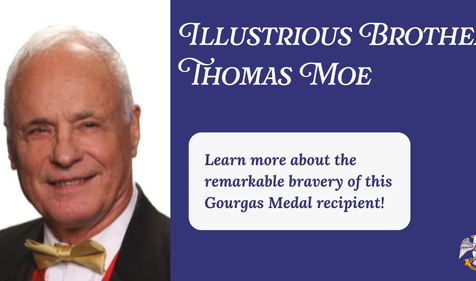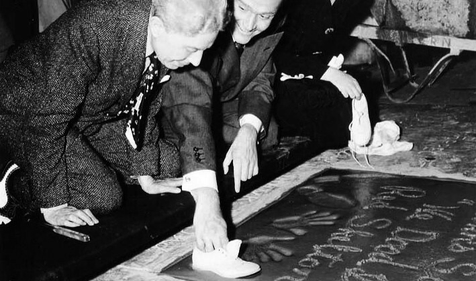Douglas MacArthur was a General in the U.S. military, a Medal of Honor recipient, and 32nd degree Scottish Rite Freemason.
“Duty, Honor, Country. Those three hallowed words reverently dictate what you ought to be, what you can be, what you will be.” - General Douglas MacArthur, 32°.
General Douglas MacArthur was as dedicated to the principles of Freemasonry and the pursuit of knowledge as he was unwavering in his ambition, commitment to service, and Devotion to Country (one of our Core Values). Brother MacArthur had a unique journey in Freemasonry, just as he did in the United States military, becoming one of the only men to achieve a five-star rank. He left a complicated legacy, as have many men who have seen and led others into combat. But there is no question his indelible contributions to our fraternity and the defense of liberty are worthy of recognition.
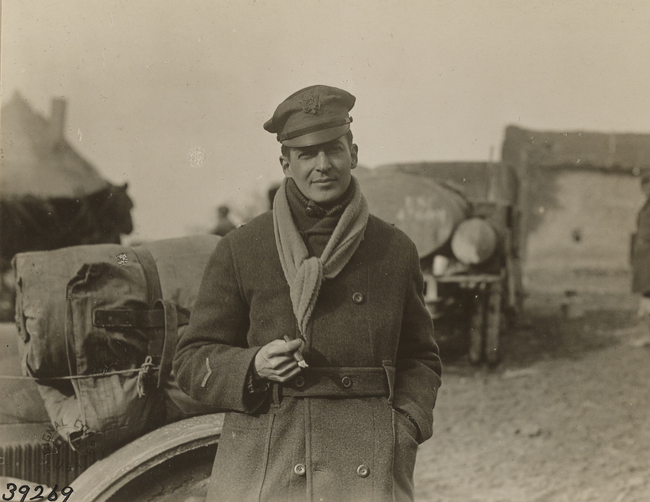
A Military Brat
Brother Douglas MacArthur, born on January 26, 1880, spent his entire life in the United States Army. He was born in the Little Rock Barracks in Arkansas to a U.S. Army Captain, Arthur MacArthur Jr., and his wife, Mary Pinkney Hardy MacArthur. His father received the Medal of Honor for his actions fighting on behalf of the Union Army in the Battle of Missionary Ridge during the American Civil War. Later, when Brother MacArthur received a Congressional Medal of Honor for his service in the Philippines campaign (he was thrice nominated), they became the first father-son duo to receive the honor.
Brother MacArthur was the youngest of three sons, following Arthur III and Malcolm. For much of his childhood, the MacArthur family lived on Army posts throughout the American West. The conditions were often dire, and, as a result, his brother Malcolm died of measles in 1883. Brother MacArthur later wrote, "I learned to ride and shoot even before I could read or write—indeed, almost before I could walk and talk." He also had a close bond with his mother, and she had a tremendous influence on him.
When Brother MacArthur was six, the family moved to Kansas, where his father was assigned to Ft. Leavenworth. A few years later, they proceeded to Washington, D.C., where his father then earned a spot in the War Department. Although he wasn't particularly impressive as a student, the influence of Brother MacArthur’s grandfather, Judge Arthur MacArthur, rubbed off on him during this period. Soon, he desired to reflect the same intellect and charm of his grandfather. His family moved again, now to San Antonio, Texas, in 1893, and he entered the West Texas Military Academy, where he excelled.
Brother MacArthur, through his combined academic accomplishments, military discipline, family's political connections, and top scores on the qualifying exam, earned a spot in the United States Military Academy at West Point upon his graduation in 1898.
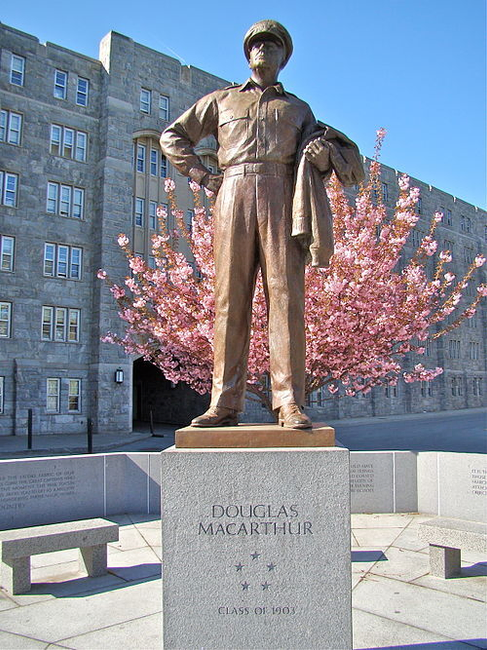
Serving with Distinction
While at West Point, Brother MacArthur played left field for the baseball team and earned 2424.12 merits out of a possible 2470.00 or 98.14% in academics. This was the third-highest score ever recorded, and he graduated first in his 93-man class. Upon graduation, he was commissioned into the United States Army Corps of Engineers as a second lieutenant.
Brother MacArthur then sailed to the Philippines to serve his first assignment. He fell in love with the islands and would return several times throughout his life to fill various posts. Before long, he set out to accompany his father across Asia, where the General was reviewing national military forces in the region.
His father passed away on September 5, 1912, before his son's promotion to captain.
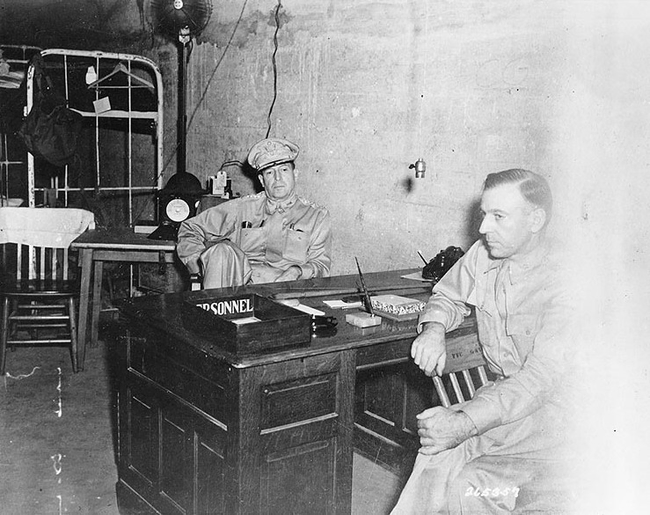
Brother MacArthur participated in the Veracruz Expedition and earned his first Medal of Honor nomination in 1914 – one he would not be awarded due to a rogue operation he led without the permission of his commanding officer. This flamboyant behavior would continue throughout his years in the military, resulting in both positive and negative outcomes, and ultimately becoming a leading trait of his reputation.
He then was deployed to France as the new 42nd Rainbow Division's chief of staff upon the United States' entry into World War I. He quickly gained a reputation for his talent as a field commander, bravely and skillfully leading attacks into German trenches.
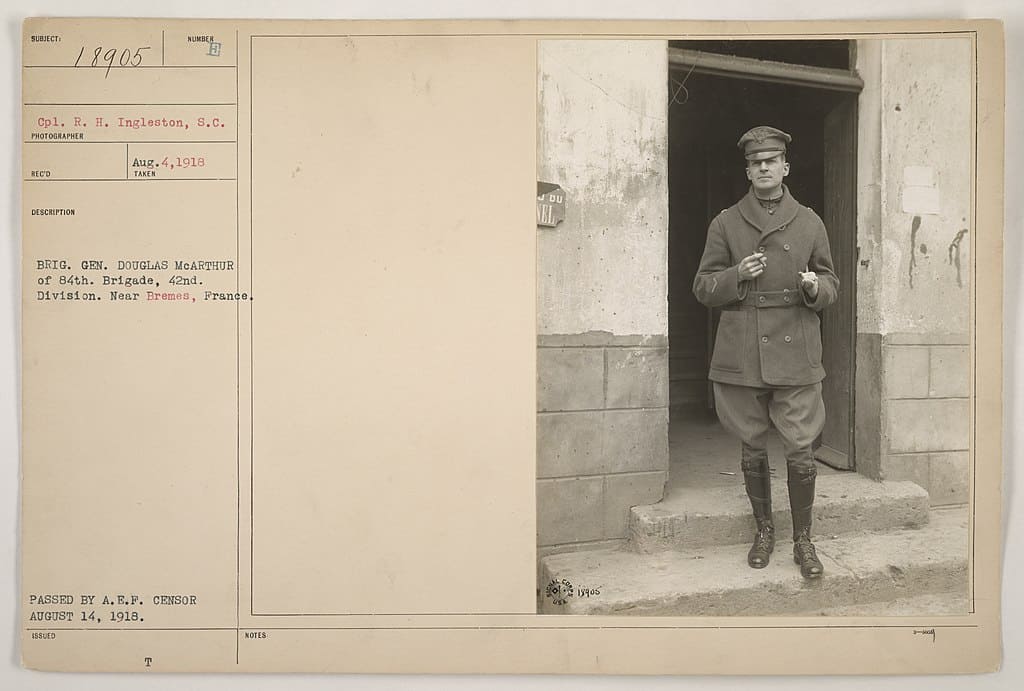
His fearlessness and success on the battlefield earned him a promotion to brigadier general in 1918 and command of the 84th Infantry Brigade. Brother MacArthur successfully led the 84th during the Battle of Saint-Mihiel and the Meuse-Argonne offensive.
Chief of Staff
Following the war, Brother MacArthur became the youngest superintendent of the U.S. Military Academy at West Point in more than a century. He spent the early 1920s focused on enacting reforms at the school and starting a family, marrying Louise Cromwell Brooks on Valentine's Day in 1922. He and Louise divorced in 1928.
Many give Brother MacArthur credit for making West Point a modern institution of higher learning, enacting reforms such as requiring all cadets to participate in intramural sports and establishing the Honor Committee. Even in academia, he faced resistance from traditionalists but nevertheless succeeded in creating widespread change throughout the school.
Several times during this period, Brother MacArthur happily returned to complete two tours of duty in the Philippines. During the first tour, he became the Army's youngest major General on January 17, 1925, at age 44. In 1930, he was appointed Chief of Staff, an unenviable position to be in at the onset of The Great Depression. Brother MacArthur attempted to preserve U.S. military might as he foresaw the rising tide of fascism throughout the world.
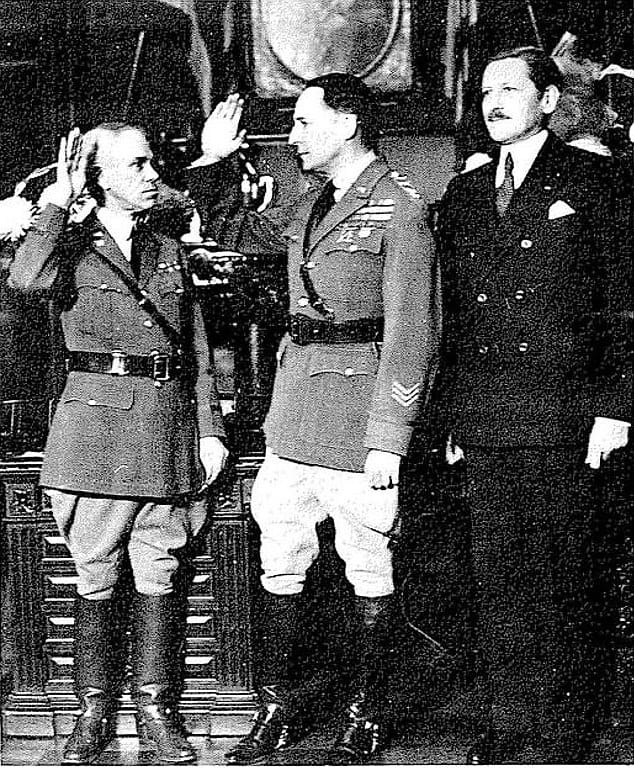
Brother MacArthur stepped down as Chief of Staff in 1935 and returned to the Philippines to help the tiny island nation establish a national army. During this time, MacArthur was made a Mason "at sight" by the Grand Master of the Philippines, an incredibly high honor reserved for exceptional cases. He was raised to the Sublime Degree of Master Mason on January 14, 1936, and became a 32nd degree Scottish Rite Freemason a few months later on March 28.
Brother MacArthur remarried the following year to Jean Faircloth, and the two had one child together.
Supreme Commander and Five-Star General
His marriage to Jean, along with the arrival of their son Arthur MacArthur IV, brought joy to Brother MacArthur's life in Manila. But the looming war with Japan was inevitable. In 1941, President Franklin Roosevelt recalled Brother MacArthur into service with the Army, promoting him to lieutenant general and commander of U.S. Army Forces in the Far East. Brother MacArthur was charged with the defense of the Philippines, but the Japanese overwhelmed the American and Filipino forces, and the Philippines were forced to surrender in April 1942.
Many historians place at least partial blame on Brother MacArthur’s tardiness in responding to the command to initiate a U.S. war plan he was responsible for leading, Rainbow Five, in the immediate aftermath of the Pearl Harbor bombing. By the time MacArthur had responded to the command, the Japanese had destroyed over half of the Far East Air Force’s aircraft.
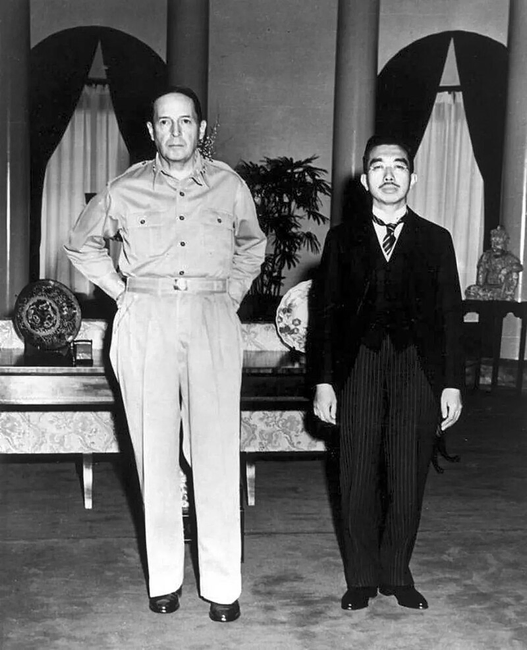
As Brother MacArthur evacuated Manila, he declared, "I came through and I shall return." We should note he was asked to alter his speech to say, “We came through and we shall return,” but refused. He was appointed Supreme Commander of Allied Forces in the Southwest Pacific Area (SWPA) and soon organized American forces in Australia to launch a counterattack in New Guinea. Coordinating with the Navy, he helped develop a new form of warfare called "Triphibious Warfare," or island-hopping. He implemented the strategy of "island hopping," bypassing heavily fortified Japanese positions and seizing key islands to advance toward Japan. Brother MacArthur's forces also fought a series of grueling battles against the Japanese in New Guinea, notably the Battle of Buna-Gona in late 1942 and early 1943. Despite initial setbacks, the Allied forces under Brother MacArthur's command eventually prevailed.
Brother MacArthur fulfilled his famous promise and, on October 20, 1944, waded ashore along with an invasion force on the Filipino island of Leyte, declaring, "I have returned." On December 14, 1944, MacArthur was promoted to General of the Army, making him one of only a handful of individuals to achieve the five-star rank. The invasion of Leyte marked the beginning of the liberation of the Philippines from Japanese occupation, ultimately leading American forces in its campaign to liberate the main island of Luzon in 1945. The battle for Manila was particularly fierce, with extensive urban combat significantly damaging the city.
Japan surrendered in August 1945, and Brother MacArthur accepted the formal surrender aboard USS Missouri on September 2, 1945. President (and fellow Freemason) Harry Truman then appointed Brother MacArthur as the military governor of Japan. He acted as the island nation's political ruler through Japanese Emperor Hirohito. Brother MacArthur presided over war crimes, trials, demilitarization, and the creation of a new constitution until power was transferred back to the Japanese at the end of the Allied occupation in April 1951.
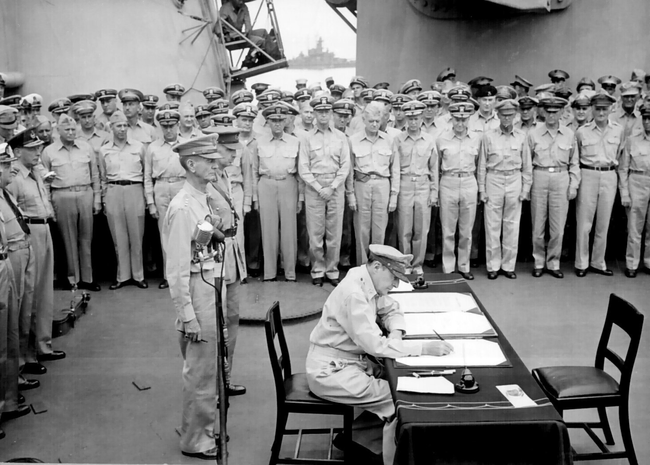
UNC Commander in Korea
In addition to his duties in Japan, Brother MacArthur was also in charge of southern Korea from 1945 to 1948. After North Korea invaded South Korea in 1950, starting the Korean War, the United Nations Security Council passed several resolutions to create a United Nations Command (UNC) to aid South Korea and named Brother MacArthur its commander.
One of his most famous strategic moves during the conflict was the daring yet successful amphibious landing behind enemy lines at Inchon on September 15, 1950. This maneuver caught the North Korean forces off guard and led to a significant turning point in the war, enabling the UN forces to push the North Korean Army back across the 38th parallel.
The following month, Chinese forces, fearing a UN presence near its border, launched a massive intervention, crossing the Yalu River and entering the war on the side of North Korea. The sudden influx of Chinese troops caught UN forces off guard and led to a dramatic reversal of fortunes on the battlefield. Brother MacArthur responded by publicly advocating for a more aggressive approach, but President Truman advocated for greater caution and relieved Brother MacArthur of his command in April 1951.
A National Legacy
Brother MacArthur remained a prominent figure and continued to be in the public eye through speaking engagements and writing. He delivered speeches, wrote articles, and authored his memoir, "Reminiscences," which was published in 1964. Throughout his retirement, MacArthur received numerous honors and awards for his military service, including decorations from foreign governments and honorary university degrees. He remained a celebrated figure in American military history despite opposing opinions surrounding his actions and decisions during his career.
Brother Douglas MacArthur passed away on April 5, 1964, in Washington, D.C., at Walter Reed Army Medical Center. His death marked the end of an era in American military leadership. He left behind a complex legacy and is remembered for his remarkable military achievements, controversial leadership style, and significant impact on 20th-century history, particularly in the Asia-Pacific region.
Brother MacArthur's enduring legacy serves as a testament to his unwavering commitment to country and duty. His leadership, courage, and resolve in the face of the world's greatest conflicts continue to inspire generations of Freemasons and patriots alike, reminding us of the enduring power of service and sacrifice. As his Brethren, we honor the memory of General Douglas MacArthur and celebrate his contributions to Freemasonry and the defense of liberty.
Related Stories
Discover additional Scottish Rite blogs and news on this topic.
-
Illustrious Brother Thomas N. Moe Awarded the Gourgas Medal for Exemplary Service to Freemasonry and Humanity
News
Read More about Illustrious Brother Thomas N. Moe Awarded the Gourgas Medal for Exemplary Service to Freemasonry and Humanity
-
The Freemason Who Created Dracula: The Story of Bram Stoker
History
Read More about The Freemason Who Created Dracula: The Story of Bram Stoker
-
A Funny Remembrance: The Life of Illustrious Brother Red Skelton, 33°
History
Read More about A Funny Remembrance: The Life of Illustrious Brother Red Skelton, 33°

